 |  |  | |
|
An up close and personal interview with U.S. Coast Guard Veteran and Togetherweserved.com Member:
MCPOCG Vince Patton U.S. Coast Guard (Ret) (1972-2002)
PLEASE DESCRIBE WHO OR WHAT INFLUENCED YOUR DECISION TO JOIN THE COAST GUARD?
Ever since I was ten years old, joining the service was a rather easy decision for me to make. My oldest brother, who is 8 years older than I, joined the Navy. I always looked up to him (even now actually) and wanted to be just like him. So for at least seven years all I kept talking about was joining the Navy to be like my brother Greg (he eventually stayed in for 34 years, retiring as a CAPT/O-6). I even became a member of the U.S. Naval Sea Cadet Corps (NSCC) during my high school years. However, at age 17, when I was old enough to sign up for the delayed entry program, I chose the Coast Guard. That's an even longer story ... but the short answer is I actually walked in to the wrong recruiting office, thinking I was going to see a Navy recruiter. Back in 1971 at the time, the Coast Guard uniform was the same as the Navy's, with the exception of the 'Treasury Shield' on the right sleeve, and the hats for enlisted were different (we used to wear the old 'Donald Duck' hats). After realizing I walked into the wrong office, I was too embarrassed to walk out, so I decided to wait until the recruiter finished talking to me, and then go join the Navy. However, not ever knowing anything about the Coast Guard at the time, I became really interested in their mission, and the fact it is a small service. So, after seven years of telling everyone from my parents, my brother, friends and teachers at school about going in the Navy to be like my brother, I enlisted in the Coast Guard's delayed entry program in January 1972, and shipped off to Boot Camp in June 1972 just three days after I graduated from high school. at least seven years all I kept talking about was joining the Navy to be like my brother Greg (he eventually stayed in for 34 years, retiring as a CAPT/O-6). I even became a member of the U.S. Naval Sea Cadet Corps (NSCC) during my high school years. However, at age 17, when I was old enough to sign up for the delayed entry program, I chose the Coast Guard. That's an even longer story ... but the short answer is I actually walked in to the wrong recruiting office, thinking I was going to see a Navy recruiter. Back in 1971 at the time, the Coast Guard uniform was the same as the Navy's, with the exception of the 'Treasury Shield' on the right sleeve, and the hats for enlisted were different (we used to wear the old 'Donald Duck' hats). After realizing I walked into the wrong office, I was too embarrassed to walk out, so I decided to wait until the recruiter finished talking to me, and then go join the Navy. However, not ever knowing anything about the Coast Guard at the time, I became really interested in their mission, and the fact it is a small service. So, after seven years of telling everyone from my parents, my brother, friends and teachers at school about going in the Navy to be like my brother, I enlisted in the Coast Guard's delayed entry program in January 1972, and shipped off to Boot Camp in June 1972 just three days after I graduated from high school.
WHETHER YOU WERE IN THE SERVICE FOR SEVERAL YEARS OR AS A CAREER, PLEASE DESCRIBE THE DIRECTION OR PATH YOU TOOK. WHAT WAS YOUR REASON FOR LEAVING?
After finishing boot camp in August 1972, I went off to Radioman (RM) 'A' School at Coast Guard Training Center, Petaluma, CA (about 70 miles north of San Francisco). I went 'RM' mainly because I had some experience in radio communications and knew Morse Code from my merit badge earnings in the Boy Scouts. I initially wanted to be a Hospital Corpsman, but the school was too long of a wait, so I went RM. It wasn't a bad choice at the time. After RM School, I reported to the USCGC DALLAS out of Governors Island, NY, after two years there, I moved on to Coast Guard Group/Air Station Detroit (my hometown). In 1976 I reenlisted, then reported to Coast Guard Recruiting Office Chicago, IL. After my tour of duty as a recruiter was up in 1978, I decided to change my occupational specialty rating from RM to Yeoman (YN). After my tour in Chicago, I moved on to the Ninth District Office in Cleveland, OH, where I worked in the personnel office, then later became the district's career information specialist. While I was in the Coast Guard up to that time, I continued on with taking college courses through the Service member Opportunity College Program (SOC), earning up to my Master's Degree in 1979. In 1981 I became the first Coast Guard enlisted member to be selected for postgraduate school program, where I was transferred to Washington, DC to attend The American University, working on my Doctorate in Education. My dissertation was based on the development and implementation of the Coast Guard Enlisted Evaluation System, which was the purpose of my selection for the postgraduate program. After graduating from American University in 1984, I remained on the Headquarters staff involved with the implementation of the new evaluation system. in the Boy Scouts. I initially wanted to be a Hospital Corpsman, but the school was too long of a wait, so I went RM. It wasn't a bad choice at the time. After RM School, I reported to the USCGC DALLAS out of Governors Island, NY, after two years there, I moved on to Coast Guard Group/Air Station Detroit (my hometown). In 1976 I reenlisted, then reported to Coast Guard Recruiting Office Chicago, IL. After my tour of duty as a recruiter was up in 1978, I decided to change my occupational specialty rating from RM to Yeoman (YN). After my tour in Chicago, I moved on to the Ninth District Office in Cleveland, OH, where I worked in the personnel office, then later became the district's career information specialist. While I was in the Coast Guard up to that time, I continued on with taking college courses through the Service member Opportunity College Program (SOC), earning up to my Master's Degree in 1979. In 1981 I became the first Coast Guard enlisted member to be selected for postgraduate school program, where I was transferred to Washington, DC to attend The American University, working on my Doctorate in Education. My dissertation was based on the development and implementation of the Coast Guard Enlisted Evaluation System, which was the purpose of my selection for the postgraduate program. After graduating from American University in 1984, I remained on the Headquarters staff involved with the implementation of the new evaluation system.
 In 1985, I then went back to sea to the USCGC BOUTWELL, when it was then home ported out of Seattle, WA. After a three year tour on BOUTWELL, I returned to Washington, DC (the Coast Guard wanted to get their money's worth out of me for that doctorate degree), and served as the first enlisted training manager for the Coast Guard's enlisted training programs. These billets were previously done by officers and civilians. In 1993, I was advanced to Master Chief, served on a six month special assignment with the DOD Task Force, and afterwards elevated to the 'Command Master Chief' status and transferred to the Coast Guard Atlantic Area, first out of New York, then Portsmouth, VA. In 1998 I was selected as the Eighth Master Chief Petty Officer of the Coast Guard (MCPOCG), and retired in 2002. In 1985, I then went back to sea to the USCGC BOUTWELL, when it was then home ported out of Seattle, WA. After a three year tour on BOUTWELL, I returned to Washington, DC (the Coast Guard wanted to get their money's worth out of me for that doctorate degree), and served as the first enlisted training manager for the Coast Guard's enlisted training programs. These billets were previously done by officers and civilians. In 1993, I was advanced to Master Chief, served on a six month special assignment with the DOD Task Force, and afterwards elevated to the 'Command Master Chief' status and transferred to the Coast Guard Atlantic Area, first out of New York, then Portsmouth, VA. In 1998 I was selected as the Eighth Master Chief Petty Officer of the Coast Guard (MCPOCG), and retired in 2002.
IF YOU PARTICIPATED IN ANY MILITARY OPERATIONS, INCLUDING COMBAT, HUMANITARIAN AND PEACEKEEPING OPERATIONS, PLEASE DESCRIBE THOSE WHICH WERE THE MOST SIGNIFICANT TO YOU AND, IF LIFE-CHANGING, IN WHAT WAY.
I served as the senior enlisted adviser to Joint Task Force 160 during 1994 as part of 'Operation Support Democracy' which was an intervention designed to remove the military regime installed by the 1991 Haitian coup d'tat that overthrew the elected President Jean-Bertrand Aristide. It was the largest alien migration operation in history, where I worked in both Port-au-Prince Haiti and Guantanamo Bay Cuba. The assignment was a temporary detailed position while I was the Command Master Chief for the Coast Guard Atlantic Area command.
FROM YOUR ENTIRE SERVICE, INCLUDING COMBAT, DESCRIBE THE PERSONAL MEMORIES WHICH HAVE IMPACTED YOU MOST?
There's two actually; first was when I was assigned to Joint Task Force 160, where I got an up close look at seeing literally hundreds of people from Cuba and Haiti defying all odds to try to get to the United States. They came in just about anything that floated.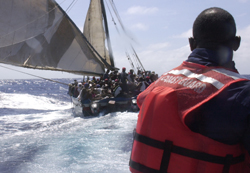 I remember seeing a giant door from a church that served as a raft with six people on board that traveled just about 50 or so miles before we were able to stop them. Bad weather was looming and they certainly would not have made it the rest of the way. Then there are the hundreds of young children, mostly malnourished with a look of desperation and hunger that just wanted to be taken care of. It was an operation that really worked on the psyche. Many of the service members involved in this operation were touched by the desperation that these people had in doing whatever it took to try to reach the U.S. in hope for a better life. It was a horrifying experience, and as I think of the earthquake in Haiti today, I can't help but think about seeing the faces on the people who spent days just floundering in the Caribbean Sea trying to reach land. Unfortunately I remember the large number of bodies from capsized makeshift vessels we came upon as well. I remember seeing a giant door from a church that served as a raft with six people on board that traveled just about 50 or so miles before we were able to stop them. Bad weather was looming and they certainly would not have made it the rest of the way. Then there are the hundreds of young children, mostly malnourished with a look of desperation and hunger that just wanted to be taken care of. It was an operation that really worked on the psyche. Many of the service members involved in this operation were touched by the desperation that these people had in doing whatever it took to try to reach the U.S. in hope for a better life. It was a horrifying experience, and as I think of the earthquake in Haiti today, I can't help but think about seeing the faces on the people who spent days just floundering in the Caribbean Sea trying to reach land. Unfortunately I remember the large number of bodies from capsized makeshift vessels we came upon as well.
The other is during the events of '9-11'. Most noteworthy was my walk along all three of the "Ground Zero" locations in NY, PA and the Pentagon, and seeing the huge destruction caused from the terrorist acts. That too was a sobering moment, but with it came a time of seeing people rise to the occasion in helping one another.  I also recall my visit to the Trinity Church in lower Manhattan, just a few blocks from where the World Trade Center towers stood. While there was complete destruction all around the area, that tiny little church on Rector Street, which also had a small graveyard with the remains of some of our founding fathers such as Alexander Hamilton (the Father of the Coast Guard), the place was pretty much untouched, with exception of debris from the destruction all around. It was an amazing sight to see, where the only damage on the church was a broken window, but on either side as well as in front and in back of the church the buildings were completely destroyed from the crashing of the airliners. It's a sight that will forever be etched in my memory and one that sticks out of truly understanding the power of spirituality. I also recall my visit to the Trinity Church in lower Manhattan, just a few blocks from where the World Trade Center towers stood. While there was complete destruction all around the area, that tiny little church on Rector Street, which also had a small graveyard with the remains of some of our founding fathers such as Alexander Hamilton (the Father of the Coast Guard), the place was pretty much untouched, with exception of debris from the destruction all around. It was an amazing sight to see, where the only damage on the church was a broken window, but on either side as well as in front and in back of the church the buildings were completely destroyed from the crashing of the airliners. It's a sight that will forever be etched in my memory and one that sticks out of truly understanding the power of spirituality.
WHAT ACHIEVEMENT(S) ARE YOU MOST PROUD OF FROM YOUR MILITARY CAREER? IF YOU RECEIVED ANY MEDALS, AWARDS, FORMAL PRESENTATIONS OR QUALIFICATION BADGES FOR SIGNIFICANT ACHIEVEMENT OR VALOR, PLEASE DESCRIBE HOW THESE WERE EARNED.
I was awarded the DSM principally for my performance of duty as Master Chief Petty Officer of the Coast Guard, where I was actively involved with the Coast Guard operations around '9-11,' as well as the responsibilities I executed during my tenure as MCPOCG.
OF ALL THE MEDALS, AWARDS, FORMAL PRESENTATIONS AND QUALIFICATION BADGES YOU RECEIVED, OR ANY OTHER MEMORABILIA, PLEASE DESCRIBE THOSE WHICH ARE THE MOST MEANINGFUL TO YOU AND WHY?
The most meaningful award to me was receiving my Cutterman's pin, which is recognition for at least five years of sea duty. Being in a seagoing service like the Coast Guard - to me, this is what it was all about. I didn't earn my Cutterman's pin until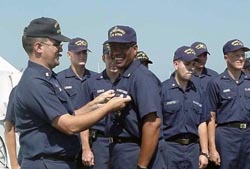 towards the end of my Coast Guard career. Prior to my selection as Master Chief Petty Officer of the Coast Guard, I had accumulated 4 yrs, 11, 19 days of sea time - just a mere 21 days short of the required 5 years. I could have remained on my last ship (BOUTWELL) to get the 5 year minimum, however I actually thought I had it, but my sea service time was miscalculated. It wasn't corrected until after my departure. So, in 2001, the Commandant of the Coast Guard, ADM Loy allowed me to take a 30 day PCS-administrative assignment from my duties as MCPOCG, to report to USCGC MAKO (home ported out of Cape May, NJ) to fulfill my required sea time, which also included having to meet underway and in port qualifications. The requirements for the Cutterman's pin also meant you had to be in a permanent change of station assignment for at least 30 days. Even with the award of the Coast Guard Distinguished Service Medal, the highest peacetime award ... the Cutterman's Pin is my most prized and valued award. Going to sea is what being in the Coast Guard is all about! towards the end of my Coast Guard career. Prior to my selection as Master Chief Petty Officer of the Coast Guard, I had accumulated 4 yrs, 11, 19 days of sea time - just a mere 21 days short of the required 5 years. I could have remained on my last ship (BOUTWELL) to get the 5 year minimum, however I actually thought I had it, but my sea service time was miscalculated. It wasn't corrected until after my departure. So, in 2001, the Commandant of the Coast Guard, ADM Loy allowed me to take a 30 day PCS-administrative assignment from my duties as MCPOCG, to report to USCGC MAKO (home ported out of Cape May, NJ) to fulfill my required sea time, which also included having to meet underway and in port qualifications. The requirements for the Cutterman's pin also meant you had to be in a permanent change of station assignment for at least 30 days. Even with the award of the Coast Guard Distinguished Service Medal, the highest peacetime award ... the Cutterman's Pin is my most prized and valued award. Going to sea is what being in the Coast Guard is all about!
WHICH INDIVIDUAL(S) FROM YOUR TIME IN THE MILITARY STAND OUT AS HAVING THE MOST POSITIVE IMPACT ON YOU AND WHY?
There were two people that I must mention here. The first one was Hollis Stephens, who served as the Third Master Chief Petty Officer of the Coast Guard. I worked for Master Chief Stephens when I was assigned to Coast Guard Group Detroit. I'll never forget what he did for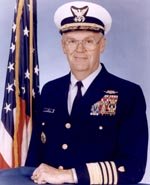 me in encouraging me to pursue my education while I was on active duty. He was the catalyst for me to want to pursue to become the Master Chief Petty Officer of the Coast Guard someday, rather than become an officer. The other person is Admiral James Loy, who was Commandant during my tenure as Master Chief Petty Officer of the Coast Guard, but I also worked for him as his Command Master Chief in Atlantic Area. The admiral believed in me, and just let me do my thing, knowing that I truly was there to support him. It's refreshing to know that your boss really trusts you in everything. He gave me the hard jobs knowing that I could handle it, and showed me just what the true meaning of leadership is all about. Just about anyone who knows or has served with him from his days in Vietnam all through his illustrious career would probably say the same thing about him as I am. He's the kind of guy that you would literally "walk through fire" without question if he asked you to. me in encouraging me to pursue my education while I was on active duty. He was the catalyst for me to want to pursue to become the Master Chief Petty Officer of the Coast Guard someday, rather than become an officer. The other person is Admiral James Loy, who was Commandant during my tenure as Master Chief Petty Officer of the Coast Guard, but I also worked for him as his Command Master Chief in Atlantic Area. The admiral believed in me, and just let me do my thing, knowing that I truly was there to support him. It's refreshing to know that your boss really trusts you in everything. He gave me the hard jobs knowing that I could handle it, and showed me just what the true meaning of leadership is all about. Just about anyone who knows or has served with him from his days in Vietnam all through his illustrious career would probably say the same thing about him as I am. He's the kind of guy that you would literally "walk through fire" without question if he asked you to.
CAN YOU RECOUNT A PARTICULAR INCIDENT FROM YOUR SERVICE WHICH MAY OR MAY NOT HAVE BEEN FUNNY AT THE TIME, BUT STILL MAKES YOU LAUGH?
Probably the one incident that still draws a chuckle occurred in boot camp. I was just three weeks in the Coast Guard, when I first encountered a picture of the Master Chief Petty Officer of the Coast Guard. I was standing in line (somewhere ... I don't remember),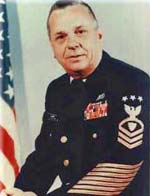 and we all had to keep our eyes and head straight and looking forward ... known as "eyes in the boat." My eyes were fixed on this large portrait of MCPOCG Charles Calhoun. Now at the time I didn't know who he was, or understand why he had three stars on his crow instead of the typical two stars for the rank of Master Chief. So, sometime afterwards I met up with my company commander and said, "I saw this picture of what I think is a master chief, but he had three stars instead of two?" The company commander quickly barked his response - "THAT'S THE MASTER CHIEF PETTY OFFICER OF THE COAST GUARD!" I then asked, "what does he do?" The company commander replied, "HE TELLS THE COMMANDANT WHAT TO DO!". A few weeks later, while talking to the career counselor who was going over my test scores and telling me which schools I was qualified to apply for, I asked being naive ... "what school do I go to to become the Master Chief Petty Officer of the Coast Guard?" Within ear shot, the company commander heard me, then he walked over yanked me out of the chair (that was back in the days when they could touch you), literally dragged me outside and made me drop and give him 50 push ups. I obliged the order quickly, and after finishing and huffing and puffing, the company commander then said, "THE DAY YOU BECOME THE MASTER CHIEF PETTY OFFICER OF THE COAST GUARD IS THE DAY THAT I'LL BE WALKING ON CLOUDS!" Of course he thought I was being a smart ass for saying that to the career counselor, but I was definitely serious about the question. Well ... fast forward 26 years later, I get selected to become the MCPOCG, and the first person I wanted to have at my ceremony was my old company commander. Unfortunately, he passed away two years before ... so I guess he really was telling me the truth - and there really were a few clouds in the sky that day too! and we all had to keep our eyes and head straight and looking forward ... known as "eyes in the boat." My eyes were fixed on this large portrait of MCPOCG Charles Calhoun. Now at the time I didn't know who he was, or understand why he had three stars on his crow instead of the typical two stars for the rank of Master Chief. So, sometime afterwards I met up with my company commander and said, "I saw this picture of what I think is a master chief, but he had three stars instead of two?" The company commander quickly barked his response - "THAT'S THE MASTER CHIEF PETTY OFFICER OF THE COAST GUARD!" I then asked, "what does he do?" The company commander replied, "HE TELLS THE COMMANDANT WHAT TO DO!". A few weeks later, while talking to the career counselor who was going over my test scores and telling me which schools I was qualified to apply for, I asked being naive ... "what school do I go to to become the Master Chief Petty Officer of the Coast Guard?" Within ear shot, the company commander heard me, then he walked over yanked me out of the chair (that was back in the days when they could touch you), literally dragged me outside and made me drop and give him 50 push ups. I obliged the order quickly, and after finishing and huffing and puffing, the company commander then said, "THE DAY YOU BECOME THE MASTER CHIEF PETTY OFFICER OF THE COAST GUARD IS THE DAY THAT I'LL BE WALKING ON CLOUDS!" Of course he thought I was being a smart ass for saying that to the career counselor, but I was definitely serious about the question. Well ... fast forward 26 years later, I get selected to become the MCPOCG, and the first person I wanted to have at my ceremony was my old company commander. Unfortunately, he passed away two years before ... so I guess he really was telling me the truth - and there really were a few clouds in the sky that day too!
WHAT PROFESSION DID YOU FOLLOW AFTER YOUR MILITARY SERVICE AND WHAT ARE YOU DOING NOW? IF YOU ARE CURRENTLY SERVING, WHAT IS YOUR PRESENT OCCUPATIONAL SPECIALTY?
I'm probably busier now than I was on active duty. After I retired, I decided I needed to go back to school just one more time ... this time to fulfill a personal desire to become an ordained minister. After graduating from the Graduate Theological Union two years after retirement, I became an ordained Unitarian Universalist minister with the specialty in community service ministry. I work as a part-time minister in a voluntary capacity with my church, Mt Vernon Unitarian Church in Alexandria, VA. In addition I serve on my denomination's Trauma Ministry Response team assisting with pastoral care in disaster situations. For my paid job, I'm director of community outreach for Military Advantage/Monster Worldwide, where I oversee our government contracted programs involved with Veteran employment, manage our career fairs, and responsible for our customer service department. I am actively involved with assisting our transition program for our Wounded Warriors. I also serve in a voluntary capacity on the First Command Educational Foundation, which is involved with providing financial literary education to high school students, and also as a member of the Board of Visitors for the National Defense Intelligence College, which is a presidential cabinet-level appointed position. I became an ordained Unitarian Universalist minister with the specialty in community service ministry. I work as a part-time minister in a voluntary capacity with my church, Mt Vernon Unitarian Church in Alexandria, VA. In addition I serve on my denomination's Trauma Ministry Response team assisting with pastoral care in disaster situations. For my paid job, I'm director of community outreach for Military Advantage/Monster Worldwide, where I oversee our government contracted programs involved with Veteran employment, manage our career fairs, and responsible for our customer service department. I am actively involved with assisting our transition program for our Wounded Warriors. I also serve in a voluntary capacity on the First Command Educational Foundation, which is involved with providing financial literary education to high school students, and also as a member of the Board of Visitors for the National Defense Intelligence College, which is a presidential cabinet-level appointed position.
WHAT MILITARY ASSOCIATIONS ARE YOU A MEMBER OF, IF ANY? WHAT SPECIFIC BENEFITS DO YOU DERIVE FROM YOUR MEMBERSHIPS?
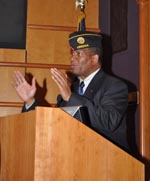 I hold membership in the following organizations: USCG Chief Petty Officer Association, Fleet Reserve Association, Veteran of Foreign Wars, American Legion, Coast Guard Combat Veterans Association, Coast Guard Sea Service Veterans of America, Non-Commissioned Officers Association, Naval Institute, Coast Guard CW Operators Association, AMVETS, Ancient Order of the Pterodactyls (Aviation), The Retired Enlisted Association and the National Association of Uniformed Services. With FRA I served as the National Chaplain from 2006-2007. I'm sort of a 'joiner' of organizations that promote and support the military services and veterans benefits and causes. I truly believe in the coined phrase from the NCOA about "strength in unity." The Coalition of Military Services which is a make up of 30+ military service associations work collectively in protecting military and veteran benefits. I'm a strong supporter to all of these organizations. I hold membership in the following organizations: USCG Chief Petty Officer Association, Fleet Reserve Association, Veteran of Foreign Wars, American Legion, Coast Guard Combat Veterans Association, Coast Guard Sea Service Veterans of America, Non-Commissioned Officers Association, Naval Institute, Coast Guard CW Operators Association, AMVETS, Ancient Order of the Pterodactyls (Aviation), The Retired Enlisted Association and the National Association of Uniformed Services. With FRA I served as the National Chaplain from 2006-2007. I'm sort of a 'joiner' of organizations that promote and support the military services and veterans benefits and causes. I truly believe in the coined phrase from the NCOA about "strength in unity." The Coalition of Military Services which is a make up of 30+ military service associations work collectively in protecting military and veteran benefits. I'm a strong supporter to all of these organizations.
IN WHAT WAYS HAS SERVING IN THE MILITARY INFLUENCED THE WAY YOU HAVE APPROACHED YOUR LIFE AND YOUR CAREER?
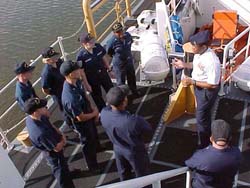 My 30 years of service taught me the value of living both the service's core values of Honor, Respect and Devotion to Duty, as well as my own personal core values that I've developed - People, Passion and Performance. I've learned that in "People" - it really is about taking care of the needs of those you serve with and for in all capacities. By "Passion" I refer to our sense of belonging - embracing our history, heritage and traditions of our service as well as our country. "Performance" is quite simply, prepare yourself well, so you can perform well, never let people down, and live with a sense of confidence, compassion and integrity. I've taken these personal values and those of the Coast Guard with me in my personal as well as professional life today. It's probably one of the main reasons why I wanted to go into the ministry after I retired. My 30 years of service taught me the value of living both the service's core values of Honor, Respect and Devotion to Duty, as well as my own personal core values that I've developed - People, Passion and Performance. I've learned that in "People" - it really is about taking care of the needs of those you serve with and for in all capacities. By "Passion" I refer to our sense of belonging - embracing our history, heritage and traditions of our service as well as our country. "Performance" is quite simply, prepare yourself well, so you can perform well, never let people down, and live with a sense of confidence, compassion and integrity. I've taken these personal values and those of the Coast Guard with me in my personal as well as professional life today. It's probably one of the main reasons why I wanted to go into the ministry after I retired.
BASED ON YOUR OWN EXPERIENCES, WHAT ADVICE WOULD YOU GIVE TO THOSE WHO HAVE RECENTLY JOINED THE COAST GUARD?
For those who are still serving I would offer this bit of advice ... stay focused on what you are doing - it is indeed transferable to working in civilian employment. Take full advantage of the educational and training opportunities that are offered. Regardless if you plan to get out in a year or 20 years, treat each day as if you're getting out tomorrow. Why? It's important to ensure that you maintain an active interest in how your military experience is translated in civilian terms - so do a few job searches every now and then to see if what you're currently doing does match with what you can do when you separate from the military. This is a good gauge for you to know what to look for in opportunities for training, education and assignments to gain the valuable experience that you can use when you leave the service. In my case I earned my initial college education through doctorate of education while on active duty which helped my military career and prepared me for a career when I retired. out in a year or 20 years, treat each day as if you're getting out tomorrow. Why? It's important to ensure that you maintain an active interest in how your military experience is translated in civilian terms - so do a few job searches every now and then to see if what you're currently doing does match with what you can do when you separate from the military. This is a good gauge for you to know what to look for in opportunities for training, education and assignments to gain the valuable experience that you can use when you leave the service. In my case I earned my initial college education through doctorate of education while on active duty which helped my military career and prepared me for a career when I retired.
IN WHAT WAYS HAS TOGETHERWESERVED.COM HELPED YOU REMEMBER YOUR MILITARY SERVICE AND THE FRIENDS YOU SERVED WITH.
I'm delighted to see so many people who I have served with or came across after so many years. It's a delight knowing that I'm part of an exclusive group of people who all share in the same common bond of our pride in our service and what we've done,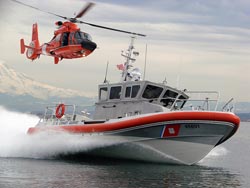 as well as rekindling the memories of all the good times (and bad times) that we've shared during our time together. We may have packed away our service uniforms, awards and so forth - but we haven't stored our memories away. 'Togetherweserved.com' helps us to keep this bond together! While there are many important and satisfying features about TWS, the most valued one is documenting your military history on your personal profile. If you don't capture it in detail now, most of what you did will go unrecorded, resulting in a tragic loss of the Coast Guard's honored history and of the sacrifices made by many. I know you are proud of what you did while serving your country and what it meant to you. Here is a chance to express that pride to your friends, family and future generations through a special URL available to non-members. I urge you to take advantage of it before it is too late. as well as rekindling the memories of all the good times (and bad times) that we've shared during our time together. We may have packed away our service uniforms, awards and so forth - but we haven't stored our memories away. 'Togetherweserved.com' helps us to keep this bond together! While there are many important and satisfying features about TWS, the most valued one is documenting your military history on your personal profile. If you don't capture it in detail now, most of what you did will go unrecorded, resulting in a tragic loss of the Coast Guard's honored history and of the sacrifices made by many. I know you are proud of what you did while serving your country and what it meant to you. Here is a chance to express that pride to your friends, family and future generations through a special URL available to non-members. I urge you to take advantage of it before it is too late.
|



Read Other Interviews in the TWS Voices Archive
|
|
Share this Voices Edition on:


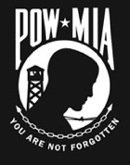  |
|
TWS VOICES
TWS Voices are the personal stories of men and women who served in the US Military and convey how serving their Country has made a positive impact on their lives. If you would like to participate in a future edition of Voices, or know someone who might be interested, please contact TWS Voices HERE.
This edition of CoastGuard Voices was supported by:

CoastGuard.Togetherweserved.com
For current and former serving Members of the US Coast Guard and US Coast Guard Reserve, TogetherWeServed is a unique, feature-rich resource enabling Coast Guardsmen to re-connect with lost Shipmates, share memories and tell their Coast Guard story.
To join CoastGuard.Togetherweserved.com, please click HERE.
| |